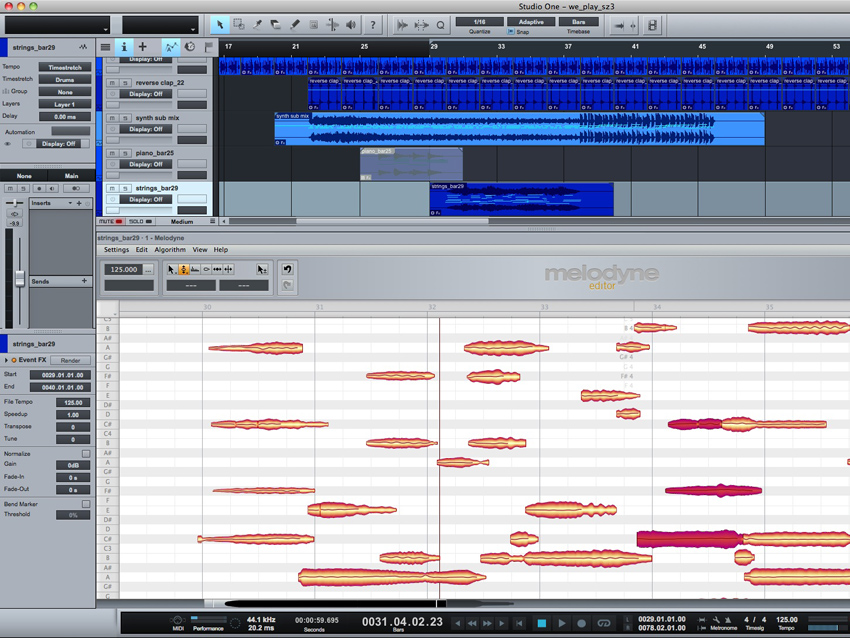PreSonus Studio One version 2 features Melodyne pitch correction

PreSonus has revealed details of the version update to Studio One, its acclaimed DAW. This includes more than 100 new features, the most eye-catching of which is the introduction of integrated Melodyne pitch correction.
When using Melodyne Essentials in Studio One Professional, edits can be made in the context of the arrangement and then rendered, with everything being seamlessly synced. Other new features include: transient detection, editing and groove extraction; multitrack comping; an expanded plug-in collection; and improved mastering facilities.
You can find out more about the headline new features below. Studio One v2 will be available in three versions: Studio One Artist ($99); Studio One Producer ($199); and Studio One Professional ($399), and will be available from 1 November.
PreSonus Studio One v2 press release
PreSonus announced version 2 of Studio One, its groundbreaking, easy-to-use DAW for Mac OS X® (Snow Leopard and Lion) and Windows® XP/Vista/7 (and soon, Windows 8). Version 2 offers more than 100 new features and enhancements, including fresh takes on multitrack comping, multitrack MIDI editing, transient detection and editing with groove extraction, and Folder Tracks. And only Studio One 2 offers exclusive, tightly integrated Melodyne pitch correction. Yet the software is still uncluttered and easy to use.
Here are some of the important new features in Studio One 2.
Integrated Melodyne pitch correction. Studio One 2 seamlessly integrates Celemony's Melodyne so tightly that, for practical purposes, Melodyne is simply a part of Studio One. You hear your edits in context with the rest of the arrangement, and when finished editing, render the audio in place—no track transfers or manual rendering! Furthermore, edits made in the arrangement are seamlessly synced in Melodyne. Want to go back to where you were? It takes one click. No other DAW can do this. Melodyne Essentials comes with Studio One Professional 2; Studio One Artist 2 and Producer 2 come with a Melodyne trial version.
Transient detection, editing, and groove extraction. Sure, you can do transient detection and editing in other DAWs—but it can be slow and painful. In Studio One, you simply select an audio event and press Q to quantize. Groove extraction is as simple as drag-and-drop; extract a groove from any audio and apply it to any other audio in seconds!
Get the MusicRadar Newsletter
Want all the hottest music and gear news, reviews, deals, features and more, direct to your inbox? Sign up here.
Multitrack comping done right. Single and multitrack comping are quick and easy in Studio One—and faster than with most DAWs! No tool-switching is needed, and crossfading between takes is automated, although you can edit the fades. Auditioning takes is as simple as holding Alt and clicking on a take.
Find it quickly. Studio One's Browser offers quick access to instruments, effects, sounds, files, and more. In version 2, you can search within any location in the Browser, making it even faster and easier to find the resources you want.
Organize your tracks. Organizing related tracks and working with them as a group is a breeze with Folder Tracks. Group and bus your Folder Tracks with the click of a button—an exclusive Studio One feature.
Edit multiple MIDI tracks simultaneously. Now you can view and edit more than one instrument track at a time in the Music Editor, including editing multiple parts on different Tracks at once.
A great plug-in collection just got better. Studio One's Native Effects plug-ins have drawn rave reviews from the media. Now they're even better. The Ampire guitar-amp modeler is now Ampire XT and features new amp models, a new convolution-based cabinet-modeling section and an effects section. And the new OpenAIR convolution reverb delivers ultra-realistic reverberation based on real spaces and classic hardware reverbs. To top it off, with the new IR Maker, you can capture your own impulse responses.
Enhanced mastering with Studio One Professional. No other DAW offers a truly integrated mastering suite comparable to the Project page in Studio One Professional. To its already extensive list of mastering and distribution features, Version 2 adds DDP Export, PQ editing, and higher-quality sample-rate conversion.
PreSonus now offers three versions of Studio One 2: Artist, Producer, and Professional. Studio One Artist delivers all of the core audio and MIDI recording and editing features, plus 26 32-bit effects plug-ins and 4 virtual instruments, and there is no limit on track count and plug-in instantiations. Studio One Producer includes everything in Studio One Artist and adds support for ReWire and AU/VST plug-ins, MP3 import and export, and additional third-party content.
Studio One Professional has everything in Studio One Artist and Producer and adds the Project page, an integrated mastering solution; fully licensed Melodyne Essential pitch correction; SoundCloud™ support; Red Book CD burning; video playback and sync; and five more Native Effects plug-ins.
Studio One 2 is expected to ship on November 1, 2011. Anticipated street/MAP prices are: Studio One Artist $99; Studio One Producer $199; and Studio One Professional $399. Upgrade paths enable users to move up as their needs grow.

I’m the Deputy Editor of MusicRadar, having worked on the site since its launch in 2007. I previously spent eight years working on our sister magazine, Computer Music. I’ve been playing the piano, gigging in bands and failing to finish tracks at home for more than 30 years, 24 of which I’ve also spent writing about music and the ever-changing technology used to make it.









